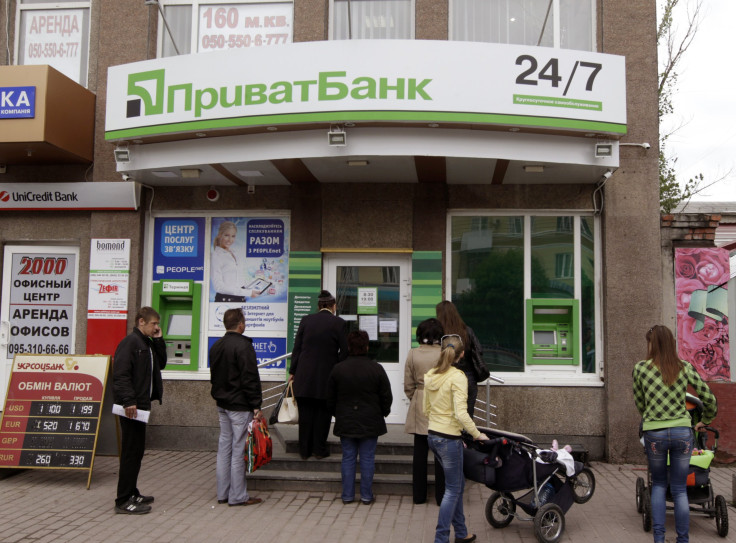Bank Run Looms in Donetsk As Eastern Ukraine Economy Worsens Ahead Of Referendum

DONETSK, Ukraine -- Nikolay Yeriomin, a 21-year-old university student of international relations, stood on Thursday outside his university building in this eastern Ukrainian city. He had just finished an exam, but his mind was on money, not grades.
For the last two days, he has not been able to get cash from any local branch of his bank. With a long weekend ahead -- May 9 is a holiday throughout the former Soviet Union, the Day of Victory celebrating the end of World War II -- he thinks most people will try to take out as much as possible.
Ahead of a planned referendum on Sunday asking eastern Ukrainians if they want autonomy or to remain in Ukraine as it is today, the economy of the self-proclaimed “People’s Republic of Donetsk” risks a disastrous bank run. “It’s basically a panic. ... People just trying to get their money out of cards because they fear banks will fold in a few days,” Yeriomin said.
Yeriomin’s bank has offered no explanation, simply telling him the money is inaccessible, and to come back later: “[The] bank says nearly nothing. They’re trying to have a poker face, but it’s a bad poker face, it’s clear they are having great problems.”
Throughout the city, there are bank machines with signs reading “out of order.” Those that are in operation have long lines, and seem to work for some customers but not for others. They also often have limits on how much can be withdrawn, normally the equivalent of $40 to $90.
“It adds to an atmosphere of stress (…) it’s hard to do anything,” Yeriomin said.
Prices are also rising. Yeriomin said buses have become more expensive to ride, with a fare increase of up to 30 percent. And in a nearby building on campus, a coffee machine sported a sign reading that the price for drinks had increased because the ingredients have become more expensive.
Meanwhile, rebels in the Donetsk region said they will go ahead with the Sunday referendum on autonomy despite a call from Russian President Vladimir Putin to delay the vote. That suits construction worker Viktor Mozgovoy just fine.
“I think that the delay was just to win some time after the events in Odessa. …. The Donetsk republic will never be the same,” he said. “We can’t wait, we have victims.” He was referring to the deaths of more than 40 people last week in clashes in the city of Odessa on the Black Sea, marking a spread of the crisis from the east to the south.
The instability since the ousting of Ukraine’s pro-Moscow President Viktor Yanukovych in February has led to lawlessness which the interim Ukrainian government tolerates, according to Mozgovoy. “There are many people now who have no rules, who can just go out to the streets and beat people,” he said while standing outside the regional administration building in Donetsk, occupied by separatists.
Around Mozgovoy, supporters showed no signs of backing down. Women handed out pro-Russian ribbons as a crowd listened to announcements from separatists. Memorials were set up with candles and flowers amid pictures of people purportedly killed during recent clashes.
Graffiti around the city showed a person throwing a swastika into a trashcan, reflecting Russia’s claim that fascists led the movement that toppled Yanukovych. An advertisement on one road promoted the referendum, showing a map of the Donetsk region with the “Donetsk People’s Republic” colors.
A member of the self-proclaimed republic’s council, Boris Litvino, said Putin’s call to delay the vote was appropriate, as the Russian leader had also said Ukraine should withdraw its troops from the region. But since that withdrawal did not happen, the vote needed to go ahead, he said: “Dozens of people died for this independence. We cannot betray them.”
But it shouldn’t be a violent separation, Litvino said. Donetsk separatists want to negotiate with authorities in Kiev in a peaceful process, he said.
The United States said in response to Putin’s call for a delay that the vote should not just be postponed but canceled, while Ukrainian Prime Minister Arseniy Yatseniuk stated Putin’s announcement was “hot air.”
Despite separatist rhetoric, pro-Russian sentiment in Donetsk appears less fervent than outside the capital of the “People’s Republic.” While the rebels claim mass support in the region, gatherings in Donetsk, a city of over a million people, normally do not pass a few hundred.
Kate, a 20-year-old university student who did not want to give her last name, said she was in favor of keeping the region as part of Ukraine -- but was skeptical that it would turn out that way, and believed that Donetsk would be annexed by Russia, as Crimea was in March. “I’m not sure if Putin’s words can stop the referendum,” she said.
The referendum will take place as the Kiev government continues its military offensive against the separatists, begun last Friday and focusing on their stronghold in Sloviansk. And after the referendum, Ukraine -- where the presidency has been held in the interim by Oleksandr Turchinov, after Yanukovych fled -- will hold a presidential election on May 25.
The threat of violence hangs over both votes, but for now the risk of a Russian invasion seems to have faded: Putin said that Russian forces were backing away from the Ukrainian border, although NATO and the United States replied they did not see evidence that Russian soldiers were retreating. That is helping fuel the fears of many Eastern Ukrainians that things may get worse. Kate, in Donetsk, was concerned about just that: “I’m just afraid more people can die.”
© Copyright IBTimes 2024. All rights reserved.




















